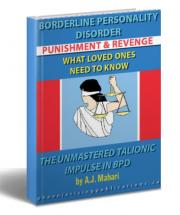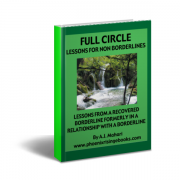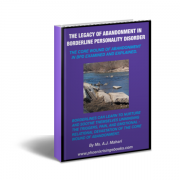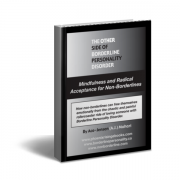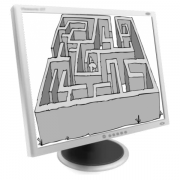![]()
Purchase all 3 of ebooks for NON BORDERLINES packaged together with or without audio.
Non Borderlines - You can purchase 6 ebooks packaged together with or without audio.
Those with BPD and/or Non Borderlines can purchase A.J. Mahari's 3 "Core Wound of Abandonment" series ebooks packaged together with or without audio.
Is there Normal Within The Abnormal?
Is there normal within the abnormal when it comes to having Borderline Personality Disorder? (BPD) Since BPD is diagnosed, seen as pathological, and/or abnormal, the question I ask you is, is there normal (rational) response through many of the traits that define BPD?
If you have BPD are you necessarily thinking "poorly" or are you thinking in the way in which a rational person would having experienced whatever trauma that you have in your life? If you have BPD are you necessarily acting "inappropriately" or are you acting as you have been taught to by all that has happened to you? Does it not stand to reason that many of your thoughts and feelings are appropriate, rational responses to all that you have experienced? Does it not stand to reason that the way that you behave can be directly traced back to the way in which it was rational to behave given what you were faced with?
I think it is vitally important that we understand not only the label, BPD, or the diagnosis but also the reasons for it. If you were sexually abused for example, (most diagnosed with BPD were - not all; MOST) how could you help but learn to distrust, to be sensitive to betrayal and to fear abandonment and rejection?
Recently, I have realized that through much (most) of my life up until now I allowed myself to be defined primarily by two things. Firstly, I allowed myself, and my world and my perception of the world, to be defined by all that happened to me and that I suffered as a child: from unmet needs, rejection, emotional abandonment straight through to my having been sexually, physically, emotionally and verbally abused.
Secondly, I allowed the label attributed to me, that of borderline, to represent the power of a "glass ceiling," if you will. The result of this over-identification with not only my past but with the BPD diagnosis has been (up until very recently) that I continued to focus way more on my brokenness than on the wholeness that I can claim and that I have been working (through therapy and life) to claim and own. There is wholeness for me, right now today, in this day and everyday in my authentic self. The same is true for you also.
Once one has been able to define core, authentic self, from the rubble of fragmented parts, and or alters, then and only then can you see that you are way more "average" than you are "sick." The world has a way of pigeon-holing us through labels. This is a a very subtle, yet very damaging reality.
The entire system of the "science" of psychology or the "science" of psychiatry are not exact sciences at all. They are systems of thought and evaluation based upon the (all too often) subjective interpretation of those who do the diagnosing. The way the system is set up sees it attempt to take your power away and attempt to tell you who you are. Refuse this. Work within the system, to get the help you may need, yes. But DO NOT do it without the knowledge that you too have power, and you have a right to your personal power.
If someone, anyone - no matter how many letters are after their name (or how many degrees they have etc) - tries to take your personal power and or rights away take care of yourself by finding another doctor, psychiatrist, psychologist, etc....
It is important to remember that you are not a freak. You are not some "weird" collection of diagnosed labels. Too often the "helping professions" are far too narrow with their applied interpretations. You must take responsibility for your own care, healing and wellness.
I have come to understand that it is equally as important to focus on who you really are and what that means for you in your life as it is to work through the "jargon" and the "labels" and the diagnosis of BPD. In much of my healing I have come to know that being Borderline did not make me half as broken, or half as "unique" or half as "weird" or different as I had always thought it did. NO, this was a mis-perception that I know I had and that I think many have. It is crucial to not isolate and to not live in your head. The more you can be with people, even when it is tense and or difficult the more you can come to see the truth of what I am saying here.
You will experience in others the best and the worst of yourself. Other people in our lives offer us the valuable gift of not only how they perceive us and experience us (which is often differently for the better or worse than the way in which we are perceiving both ourselves and how we think others are seeing us), but they offer mirrored experience, shared experience and shared realities that will help you get to know you better.
Knowing that you have certain things to work on and certain areas in your life, your personality or your general make-up (which is affected by how one is treated in childhood) is an important thing for sure. However, living up to the BPD label can be a real danger. It is important to recognize what BPD is and what it means for you in your life. It is equally as important to also consider that the reality and label of BPD are not one in the same. Many professionals, as well as many people, generally, have come to pre-judge BPD in a very biased and dangerous way. So within the label or the diagnosis or that categorization there are important things to learn and to change in your life so that you can have a functional, productive and reasonably happy life. However, there are dangers that must be dealt with when it comes to labeling generally and being labeled BPD, specifically.
So, is there "normal" or average within the "abnormal"? You bet there is. It is not only people with BPD that have problems or issues or difficulties in relationships. NO. You cannot go on doing yourself the disservice of such focus on your brokenness or personality disorder that you fail to see your humanity. Within the context of humanity and what it is and means to be human there is much that could be labeled "abnormal." Having BPD means that you have a challenge that some others don't have. It does not mean that you are damaged goods, unworthy, unloveable, undeserving or some how generally "less than," NO! NOT AT ALL!!!
Make room in your life and in your perception and experience today for the reality that you are on a journey and that upon your journey you DO fit in, you are a part, a part of the main, that is and makes up humanity.
Normal, abnormal, healthy, unhealthy, good, bad, and so on are all polarities. Life does not have to be lived or contemplated in extremes. Personality disorder or not, there is all of the aforementioned in the experience of what it is to be human.
The space in which the "normal" is experienced within the "abnormal" is your journey toward being who you authentically are. The "abnormal" is not necessarily so abnormal. Something can only be "abnormal" when someone has defined and judged and perceived it as such. There is a lot of average to be held and felt and experienced in your life whether you have BPD or not.
It's time to think less about those who do not have a personality disorder being "more than" and time to think less about those with a personality disorder as being "less than" and it is definitely time to think MORE about all that it is and all that means to be in flux within (or slightly on the outside) of what the world calls "average." After all, average can no more be an objective reality than anything else in life.
Subject yourself to a new way of thinking. Think beyond the label, beyond the diagnosis and beyond every action you take or thing you say and stop categorizing the sum total of who you are according to the label they've given you to wear.
© Ms. A.J. Mahari - April 11, 1999
Purchase all 3 of ebooks for NON BORDERLINES packaged together with or without audio.
Non Borderlines - You can purchase 6 ebooks packaged together with or without audio.
Those with BPD and/or Non Borderlines can purchase A.J. Mahari's 3 "Core Wound of Abandonment" series ebooks packaged together with or without audio.




